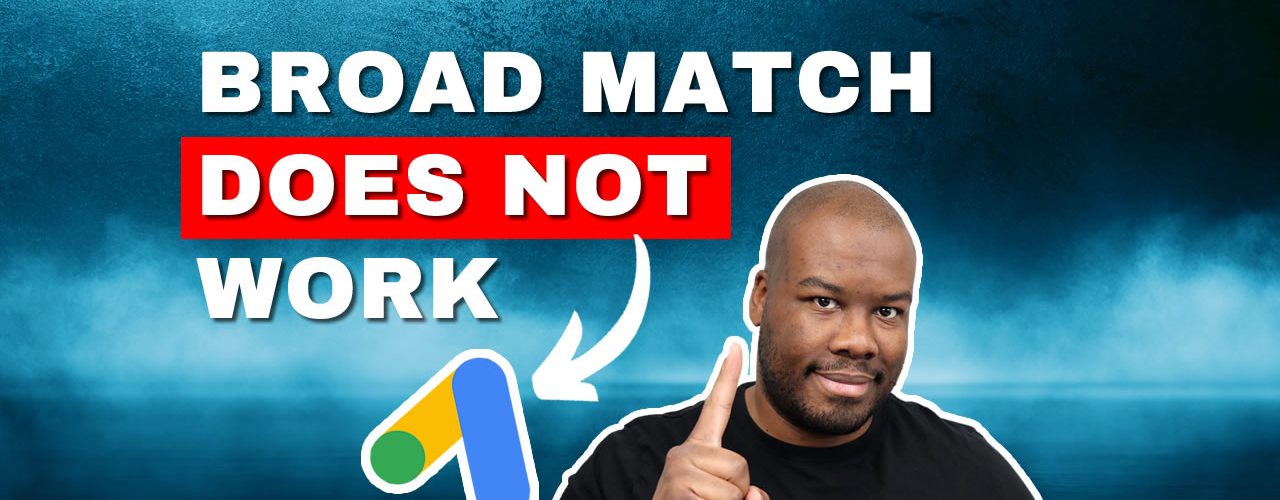A couple of years back, Google said that we should all be using broad match keywords because they gave broad match a superpower. They said that broad match had enhanced capabilities at the point of auction where they could adjust bids based on many more contextual signals from broad match traffic and those longer tail search terms that broad match likes to generate.
In fact, it goes beyond that because anywhere in the platform you go, say you want to add some phrases and some exact match keywords into your account. Google will say, um, you should be using broad match here. And they actually mark down your optimization score for not using broad match. And earlier this year they made a setting at campaign level where you can actually say to Google, make sure all of my keywords are broad match.
So they’re really, really trying to push this. So for this video, I’m speaking specifically to people who have set up a campaign using broad match following Google’s advice. And their results just aren’t there. I’m gonna look at the reasons why broad match isn’t working for you specifically. The first reason that broad match probably isn’t working well for your business is because you are not getting enough volume of conversions to justify using broad match.
When using broad match, Google uses those enhanced signals at the point of auction to find people most likely to convert. Google only knows who’s most likely to convert based on user behavior. And measuring conversions in your account, understanding how people interact with your ads, and then finding people who are most likely to convert.
The less conversions you have, the harder it is for Google to find people most likely to convert. So that is a big reason why broad match probably isn’t working for you. So what do I mean when I say too few conversions? Well, there’s a couple of ways to look at it. I’m working with a customer right now.
Who is getting maybe 80 conversions a day. They’re on broad match. Their campaign is flying. It doesn’t need necessarily any other match types in there because broad match is covering everything. The campaign is optimized amazingly, and it’s doing really well. Conversely, I’m working on another account where we’ve trialed the broad match approach.
It just isn’t working properly for this advertiser because they don’t have enough conversions. They get maybe 15 conversions a month, but they’re happy with that. They’re happy with getting 15 conversions. The cost per lead is perfect. It’s a very niche industry, and it means one lead could turn to a massive sale of say, a hundred thousand pounds.
So they’re actually quite happy with that particular campaign. What they weren’t happy with was how broad match was performing, and I agree, of course, if it’s not working, You don’t have to use it. You don’t have to listen to Google. Another reason it might not work is something I just mentioned, and that is the industry is too niche because the more data points Google has, the better it’ll find those conversions using broad match.
But Google as mentioned in their conference a few months ago, they don’t just look at conversions in your account. They look at every search happening across Google and how customers behave, what their historic searches are, the whole portfolio across all of their systems. Google is tracking user behavior.
So with all these signals, Google get pretty good at understanding whether people are likely to convert with your business. If you’re running campaigns in a very niche industry in the B two B sector specifically as well, then what’s more than likely going to happen is Google are gonna start matching your broad match searches to more consumer-based searches and things that have wide appeal, because Google has plenty of data on who’s converting in the wider market.
But if your product offering is incredibly niche, They don’t have that much data, so they will try and match those broad match terms to what they think will work. Because of those niche kind of terms you’re bidding on, they will try and match them to things that are more consumer based and have a wider appeal, and you end up just going through your negative keyword list like, what the hell am I doing?
But ultimately if you are running a niche B two B campaign, then you probably don’t benefit from broad match very well. Another reason broad match probably isn’t working for you is because you are using Google Ads the way Google Ads used to be as opposed to the way that it is. So what do I mean by that?
If you go back in my older videos, you would’ve seen I advocated for a campaign set up structure known as scags, which stands for single keyword ad groups. And that’s literally what it meant. It meant every single keyword had its own ad group, which enabled every keyword to have its own specific, highly relevant ad copy tailored to that specific keyword.
It was a very good way to maximize quality score, to maximize click-through rates and user behavior across your campaigns. It’s a strategy that I used to advocate for, and it’s something that used to work, but because of the way Google is now, they can understand so many more things at the point of auction that you’re basically chucking Google’s power in the bin if you try and go against it in a lot of ways because you’re not gonna benefit from smart bidding and if you are not benefiting from it.
You better believe your competitors are. So I don’t really advocate for this setup structure anymore, but if you’re still using it, then migrate to broad match. Or even if you’re not necessarily using a single keyword ad group setup, you’re using something that’s still pretty tight. Maybe you’ve got 30 or 40 ad groups with really, really tightly themed keywords with maybe five keywords in each ad group.
If you go to broad match at that point, there’s not gonna be nearly enough data going through those ad groups and through those ads and through those responsive search ads. In order for Google to optimize performance effectively using smart bidding and using broad match as well, you’re gonna struggle to get better results because you need data going through a campaign for Google to optimize.
And if you limit that data with your structure, Then you’re not gonna get success from broad match keywords. Another reason broad match might be failing you is because you value a really strict and targeted C P a more so than an uplift in overall conversion volume. So what does that mean? Okay, so if you have a campaign running and you are very focused on getting a 30 pounds cost per lead at absolute maximum, there’s no way you’re willing to pay a single penny more for a conversion.
If you move over to broad match, what will happen is you will probably get more conversions, but Google might struggle to bring your cost per lead in at the right target. That’s always the battle between smart bidding. Using broad match and using more focused match types is you’re gonna get that balance between the cost per conversion and the overall conversion volume.
Google will always advocate for higher conversion volumes. All of the stuff you read in your, um, recommendations when you see what you should be doing to campaigns, Google will always say, if you spend X, you’ll get X more number of conversions. If you do this, you’re gonna get this many more conversions.
They never, ever mention the cost of those conversions, even though it’s likely that it will go up with the actions they’re suggesting. If you can afford to pay a bit more for a lead and get more quantity of leads, then overall it’s probably going to benefit your business with the higher quantities as long as you’re closing those leads effectively.
However, if you are really strict on your cost per lead and you need to make sure all your numbers stack up at the end of the month when you’re bringing in your sales, then broad match probably isn’t gonna work for you. You’re gonna see the volume increase, but so will your cost per lead. Finally, the reason that broad match probably isn’t working for you is because you are not policing the negative keywords.
Effectively, with broad match, Google is gonna match your campaign and your searches to so much more than it would with exact or phrase, way beyond the realms of anything, even sometimes related remotely to your campaigns. And that’s a problem, and it’s something you really need to work on in terms of adding negative keywords to your campaign to help.
Solve that problem and it gets really difficult because if you are imagining a campaign where it’s getting tons and tons of searches and you’re getting loads of loads of search term data, well not as much as you used to. Of course Google hides most of it, but the data we do have, if you’re looking through there and you’re seeing tons and tons of irrelevant searches and you are eliminating them using phrase match negative keywords at the point where you’re seeing them in that search terms reports, it’s a very boring exercise.
And furthermore, because of the nature of broad match matching way beyond the realms of what you might be bidding on directly as a keyword, what you might find is you see patterns in how people are matching to your campaign that you can’t actually stop effectively. I’ll give you an example. There’s a company I’m working with now and a lot of firm names are coming up in their search term report in terms of individuals and consultants.
Who are working within their field and coming up in the search terms. These terms aren’t converting well and you, you keep adding negatives and negatives and negatives on top of that and identifying them, and there’s just so many think of how many people are in a given industry. Either companies or named individual consultants are coming up in the search terms reports.
It’s really, really difficult to police. There are ways I’m identifying some of these keywords with a bit of help from chat G P T in order to identify them and help me build out effective negative keyword lists. But if you’re not doing that and you’re not that invested in generating negative keywords to the degree that you need, then broad match just isn’t going to work for you.
So those are the five reasons. Broad match probably isn’t working for you. And what’s the biggest takeaway from all this is basically, Do what’s right for you. Google will mention you should be using broad match across everything. They’ll keep pushing it in platform across when you’re adding non broad match keywords, making it a setting at campaign level.
All of these different things do what’s best for your campaigns. If you need to use exacts and phrase, use exacts and phrase. While we still have them, by the way, Google might get rid of them, who knows? But with that said, I think if you’re getting enough conversion volume and you wanna push your campaign to maximize your overall performance, I think it’s worth testing broad match because you can get fantastic results from it.
In the right industry, when everything lines up perfectly, you’re gonna see your campaign results skyrocket, and Google just takes off and finds conversions that you never would’ve had. With a more focused match type and bring them in at the right cost with smart bidding. But as I say, you’ve gotta make sure the conditions are correct and hopefully this video helps you understand whether or not the conditions for your broad match structure are correct.
Thanks for watching. Like this video. If you like it, don’t forget to subscribe. Don’t forget to head over to Darren taylor.com and hire me as your consultant for your campaigns. Don’t forget to subscribe to this channel and I’ll see you guys on my next video.







